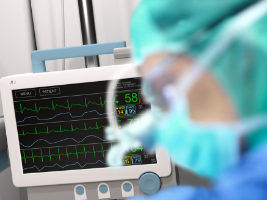Thanks to a Catalyst Fund award from the Elizabeth Blackwell Institute, Engineering Mathematics Professor Alan Champneys, was able to assemble a cross-disciplinary team from the University of Bristol Departments of Engineering Mathematics, Mathematics, and Experimental Psychology to work with Consultant Chris Bourdeaux and his team at the BRI. They built on earlier EBI Institute funded work by Dr Bourdeaux and Professor Iain Gilchrist from Experimental Psychology who used a combination of data science and nudge behaviour to improve intensive care. This new study has now brought the full force of tools from artificial intelligence to the wider problem of patient planning.
The results, which have now appeared online in the British Medical Journal, show how machine learning techniques can be successfully applied retrospectively to routinely collected data to learn how to tackle problems in health care for future patients. In particular, the work addresses how to identify patients who are ready to be safely discharged from ICUs.
Why might such an approach be necessary? Professor Champneys explains: "It is hard to accurately predict outcomes on ICU wards. After talking with the clinicians, we realised that the ICU doctors are remarkably good at treating the diverse acute symptoms of patients on their ward. What they are less good at is being able to predict what is the likely remaining length of stay until the patient is ready to leave the ward. Access to such real-time information is crucially important in balancing the needs of the entire hospital, for example to avoid wasteful cancelations of operations because there is no ICU bed available on the day."
Of course, there are a number of reasons why hospitals should try to discharge patients as early and as safely as possible - patient wellbeing, bed availability and not least, cost reduction. But it’s critically important to identify when it’s safe to do so. Professor Champneys recognised that this problem needs the latest thinking in data science, and he was able to call upon the expertise of Dr Daniel Lawson in Mathematics and Dr Raul Santos-Rodriguez in Engineering Mathematics. The team made use of routinely collected patient data, which is held on hospital servers for service evaluation and auditing. This data was fully anonymised and then used to train machine learning algorithms, which can recognise when patients appear to be ready for discharge.
Don’t think that all of this technology makes medics redundant, though. Professor Champneys said: “The intention is not to replace doctors at all, but rather to support their decision making by presenting complex data in a manner that is easy to digest. This would enormously help by presenting information in simple formats, and decisions easier, in stressful working environments.”
In modern medicine, vast amounts of data are gathered routinely, but they are difficult to interpret as everything is so complicated. Untangling them is a challenge. Professor Champneys’ team appointed a Research Associate, Dr Chris McWilliams, to do a substantial amount of the work. He was given access to the necessary data systems at the Bristol Royal Infirmary ICU, but the potential has much further reaching consequences.
Dr McWilliams is optimistic about the future of the project: “This is a proof-of-concept for the way that tools from data science can be applied to solve healthcare problems in a modern, data-rich digital hospital. The type of patient data currently available on the ICU will soon be produced by paperless systems across the entire University Hospitals Bristol Trust, so the big-picture goal is to work towards a learning healthcare system implemented here in Bristol.”
That goal is not as far away as it might seem. Preliminary outcomes of the research have formed a key part of several large research bids, and is an integral part of the University of Bristol's digital health strategy. The outcomes were also included in a successful University of Bristol bid for two MRC UKRI Innovation / Rutherford Fund Fellowships in Health Data Research.
The project has already led to funding of a PhD student through the NIHR Bristol Biomedical Research Centre, a new collaborative possibility with Systems C, the clinical data management company and commercial partner in the NHS Global Digital Exemplars project, and a variety of new funding opportunities are all being investigated.
